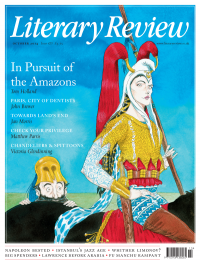Alan Forrest
Napoleonic Coda
Napoleon: The End of Glory
By Munro Price
Oxford University Press 324pp £20
The Longest Afternoon: The Four Hundred Men Who Decided the Battle of Waterloo
By Brendan Simms
Allen Lane/The Penguin Press 127pp £14.99
As we approach the two-hundredth anniversary of the Battle of Waterloo and the jamboree of commemorations that it will unleash, it is perhaps salutary to ask what it is that we will be celebrating. Waterloo was Napoleon’s last battle, the defeat that condemned him to a second abdication and removal from the European stage. But did it really bring down Napoleon? Or was his career effectively already over in 1814, following his crushing defeat at Leipzig and an invasion of France that brought his enemies to the very gates of Paris? His subsequent escape from Elba and the military adventure of the Hundred Days might appear to suggest that he could have again charmed France and reconquered Europe. But in reality this was little more than an exercise in self-deception. The Great Powers, with Tsar Alexander I of Russia at their head, were determined to oppose any settlement that maintained the French Empire, and they had the military clout to enforce their will. The historian is entitled to ask whether Waterloo was anything more than a footnote to over twenty years of war.
That is the dominant view across most of the Continent, though not in Britain, and it is the one to which Munro Price subscribes in this study. He states unequivocally in his introduction that it was Napoleon’s first overthrow, in 1814, that was decisive, the moment that deprived him of

Sign Up to our newsletter
Receive free articles, highlights from the archive, news, details of prizes, and much more.@Lit_Review
Follow Literary Review on Twitter
Twitter Feed
Under its longest-serving editor, Graydon Carter, Vanity Fair was that rare thing – a New York society magazine that published serious journalism.
@PeterPeteryork looks at what Carter got right.
Peter York - Deluxe Editions
Peter York: Deluxe Editions - When the Going Was Good: An Editor’s Adventures During the Last Golden Age of Magazines by Graydon Carter
literaryreview.co.uk
Henry James returned to America in 1904 with three objectives: to see his brother William, to deliver a series of lectures on Balzac, and to gather material for a pair of books about modern America.
Peter Rose follows James out west.
Peter Rose - The Restless Analyst
Peter Rose: The Restless Analyst - Henry James Comes Home: Rediscovering America in the Gilded Age by Peter Brooks...
literaryreview.co.uk
Vladimir Putin served his apprenticeship in the KGB toward the end of the Cold War, a period during which Western societies were infiltrated by so-called 'illegals'.
Piers Brendon examines how the culture of Soviet spycraft shaped his thinking.
Piers Brendon - Tinker, Tailor, Sleeper, Troll
Piers Brendon: Tinker, Tailor, Sleeper, Troll - The Illegals: Russia’s Most Audacious Spies and the Plot to Infiltrate the West by Shaun Walker
literaryreview.co.uk